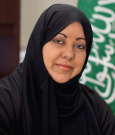In 1974, First Lady Betty Ford spoke publicly about her breast cancer diagnosis and treatment. Remarkably, at the time of her action, public discussion of breast cancer in the United States was seen as off limits. Four decades later, cultural barriers to women’s health still exist, particularly in the developing world.
Historically in Arabic culture, open discussion of breast cancer has been strictly taboo. In 2006, Samia
Al-Amoudi, MB, ChB, was diagnosed with breast cancer in her native country of Saudi Arabia. She bravely chose to break the culture-bound silence and speak openly about her breast cancer.
Dr. Al-Amoudi is currently Chief Executive Officer, founder, and a board member of Sheikh Mohammed Hussein Al-Amoudi Center of Excellence in Breast Cancer. She is also a consulting obstetrician and gynecologist, and the author of several books on obstetrics/gynecology and breast cancer, including Breast Cancer, Break the Silence (see sidebar), in both Arabic and English. She recently shared her story with The ASCO Post.
Dealing With the Bad News
Please tell the readers about your breast cancer diagnosis.
One day after having lunch with my children, I was in my bedroom, and by mere chance I touched my breast and felt a lump. Being a physician, I realized that there was a good chance that I had breast cancer. I remember walking around the room in circles praying loudly.
I was concerned about breaking the news to my children so I used a bit of a ploy, telling them that a friend of mine in the United States discovered a lump in her breast that was most likely cancer, and she didn’t know how to tell her children. My children listened and said that all children would be scared for their mother, but the best way to tell them was by being straightforward. That was the first hurdle in breaking the bad news.
Then, in April 2006, a biopsy test confirmed that the lump was malignant. I was diagnosed with HER2-positive stage II breast cancer; it was on my birthday. Now I needed to have a serious conversation with my children. I told them about the biopsy and explained that there are many different types of breast cancer, some of which a woman can survive more than 20 years. Of course, there were many difficult moments with my children, but the experience gave my love for them new meaning.
Path to Advocacy
How did you transition from a breast cancer patient to an advocate for open dialogue about a disease that is not spoken about publicly in the Arab world?
First of all, I decided to remain in my country for my treatment instead of going to a cancer center in the United States. Saudi Arabia is a wealthy country, and I trusted the ongoing medical advances there as well as my people.
So many people asked how this could happen to me, a doctor. Of course, cancer can happen to anyone, but the message I took away from my diagnosis was that early detection in cancer is so important. In my country, 73% of women diagnosed with breast cancer have advanced-stage disease, and even more worrisome, 30% of those women are younger than 40 years old.
The main problem that women confront in the Arab culture, however, is the taboo about discussing medical issues that involve an intimate female body part. So, if women can’t talk about breast cancer, it prevents them from accessing regular early detection tests to catch the cancer at an early, curable stage. My mission became to break the silence and spread the message about proper breast health in Saudi Arabia’s conservative community. The ultimate goal was to save women’s lives.
How did you approach this mission?
First, I wrote my story in the local newspaper, Al-Madina. Someone remarked to me that being a well-known physician, publicizing my story was like committing self-defamation. I told him that his remark was the exact kind of attitude that I felt compelled to challenge.
That experience inspired me to establish the Sheikh Mohammed Hussein Al-Amoudi Center of Excellence in Breast Cancer within the King Abdulaziz University. Since then, I continued my advocacy for openness in women’s health issues, and people are now talking about subjects that were once forbidden in Saudi Arabia.
Award and Recognition
In 2007, then Secretary of State Condaleeza Rice presented you with the International Women of Courage Award. You were the first Arab woman to receive it. What did that mean to you?
Of course I was honored by the award and the recognition. But my ultimate mission is to help empower women about their health. My focus now is on breast cancer patients’ rights in prevention and treatment. Most important, I will continue to break the silence and taboos that for too long have been a barrier to women’s health. ■
Disclosure: Dr. Al-Amoudi reported no potential conflicts of interest.


